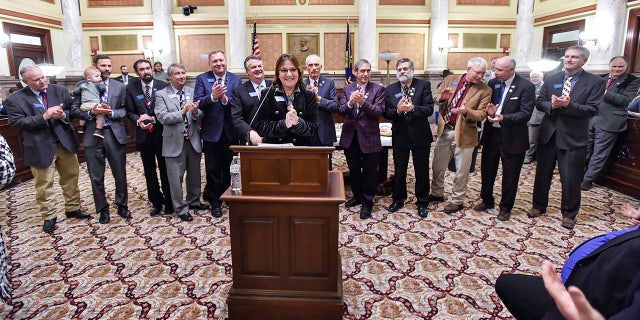by DAVID A. LIEB Associated Press

Frustrated by college diversity initiatives he says are “fomenting radical and toxic divisions,” Texas state Rep. Carl Tepper set out to put an end to diversity, equity and inclusion offices in higher education.
The freshman Republican lawmaker filed a bill to ban such offices. Three months later, he filed a new version of the legislation doing the same thing. The difference? Tepper switched the wording to align with a new model bill developed by the Manhattan Institute and Goldwater Institute, a pair of conservative think tanks based in New York and Arizona, respectively.
Republican lawmakers in at least a dozen states have proposed more than 30 bills this year targeting diversity, equity and inclusion efforts in higher education, an Associated Press analysis found using the bill-tracking software Plural. The measures have become the latest flashpoint in a cultural battle involving race, ethnicity and gender that has been amplified by prominent Republicans, including former President Donald Trump and Florida Gov. Ron DeSantis, potential rivals for the GOP presidential nomination in 2024.
Many of the proposals root in one of a half-dozen conservative or libertarian organizations offering recommendations for limiting consideration of diversity, equity and inclusion in employment decisions, training and student admissions. Some measures mirror the model bills nearly exactly. Others copy key definitions or phrases while adapting the concepts to their particular states.
“There’s a tremendous appetite on the right to deal with this issue,” said Joe Cohn, legislative and policy director for the Foundation for Individual Rights and Expression, which in February added its own model bill to the swelling ranks of proposals.
The bills are an outgrowth of recent Republican attempts to limit critical race theory, a viewpoint that racism is historically systemic in the nation’s institutions and continues today to maintain the dominance of white people in society. Christopher Rufo, who now is a senior fellow at the Manhattan Institute, helped propel conservative outrage in 2020 against what he has described as critical-race-theory concepts infiltrating governments and educational institutions.
Trump responded by issuing an order in September 2020 banning training involving “divisive concepts” about race for government employees and contractors. Similar wording began cropping up in state-level legislation the following year.
Florida’s so-called “Stop WOKE” law, which DeSantis signed last year, is among the most prominent measures. It bars businesses, colleges and K-12 schools from giving training on certain racial concepts, such as the theory that people of a particular race are inherently racist, privileged or oppressed. Courts have currently blocked the law’s enforcement in colleges, universities and businesses.
DeSantis has continued to press the issue. He proposed legislation this year to ban diversity, equity and inclusion offices as part of a broader agenda to reshape higher education. He also appointed Rufo and other conservatives to the New College of Florida’s oversight board, which then abolished the liberal arts college’s office that handles diversity, equity and inclusion programs.
“DeSantis has been so vocal about the changes he wants to make in universities that it has probably spurred activity in other states,” said Jenna Robinson, president of the James G. Martin Center for Academic Renewal, a conservative nonprofit based in Raleigh, North Carolina.
On their face, diversity, equity and inclusion may seem uncontentious. Higher education institutions, along with many businesses, have devoted resources to inclusivity for years.
“DEI is woven into the fabric of good universities,” said Karma Chavez, chair of the Department of Mexican American and Latina/o Studies and co-chair of the College of Liberal Arts diversity committee at the University of Texas.
Campus DEI offices often spearhead services tailored to students of various races, genders, sexual orientations, cultures and abilities. Some college administrators also consider diversity and equity when admitting students, providing scholarships or deciding which faculty to hire and promote. Applicants may be asked not only for resumes and references, but also for statements about how they would advance DEI efforts.
Tepper contends DEI initiatives are “ideologically driven” on a “Marxist foundation.” Republican lawmakers in other states have used similar arguments.
During a recent Missouri House debate, Republican Rep. Doug Richey put forth a series of budget amendments prohibiting state funding for DEI initiatives in government agencies and higher education. He asserted the offices espouse “racist policies” and “Marxist ideology that is trying to strip away from us the concepts of the nuclear family, of merit, of character and of being judged by what you are capable of.”
Provisions blocking spending on diversity, equity and inclusion efforts also have been added to budget bills in Kansas and Texas. Separate bills banning spending for DEI offices in higher education have been proposed in Arizona, Florida, Iowa, Oklahoma, Utah and West Virginia, though some of those already have failed.
Other bills, such as in Ohio and South Carolina, would allow such offices but ban mandatory DEI training and forbid administrators from requesting DEI statements from staff and students.
Texas Gov. Greg Abbott’s administration warned state entities in February not to use DEI factors in employment decisions. That prompted the state’s largest university systems to pause such practices and led students at the University of Texas to organize in defense of DEI efforts.
“It feels like an attack on my identity,” said Sameeha Rizvi, a university senior who said she has benefitted from DEI initiatives as a Muslim woman of color with a disability. “It is exceptionally hurtful and tiring to see this very hateful rhetoric being employed by legislators.”
The American Association of University Professors, which has about 45,000 members nationwide, said the bills mischaracterize DEI initiatives.
“They’re dog whistling that DEI initiatives are something sinister and subversive that people should be afraid of, and that’s not true at all,” association President Irene Mulvey said.
The Martin Center and Goldwater Institute released model legislation last year describing mandatory DEI statements from students and staff as a prohibited “political test.” Lawmakers in Georgia, Florida, Oklahoma and Texas all filed bills this year using the suggested wording.
Cicero Action, an advocacy group based in Austin, Texas, and the newly formed Do No Harm organization, based in Richmond, Virginia, also have provided guidance to state lawmakers drafting bills against diversity, equity and inclusion requirements in higher education. Similar bills in Missouri and Tennessee both follow Do No Harm’s outline of barring mandatory DEI instruction for medical students and health care providers.
University of Missouri medical students have lobbied against the legislation, asserting it could jeopardize the school’s accreditation and prevent doctors from learning about unique circumstances affecting the health of people from various ethnic, socioeconomic and geographic backgrounds.
“We’re not just hurting ourselves, we’re hurting patients if these bills get passed,” medical student Jay Devineni said.









